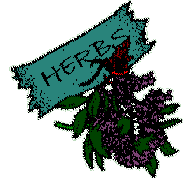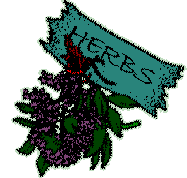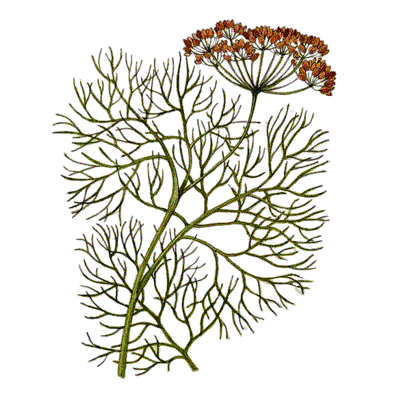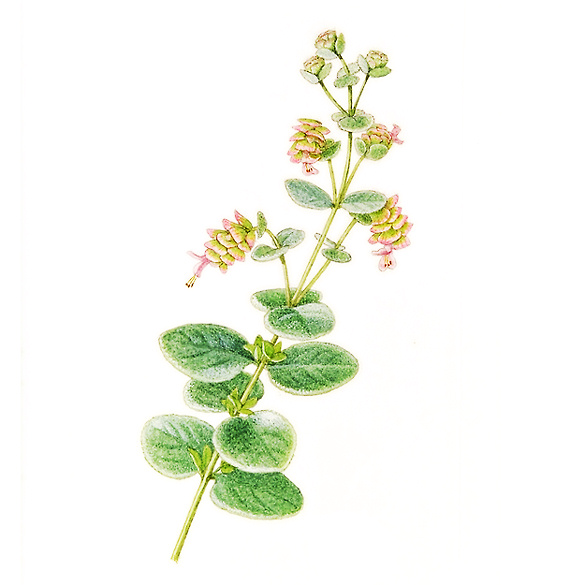 Herbs--D
Herbs--D 
 |
Common Names: Dandelion, Blow Ball, Lion's Tooth, Wild Endive Latin Name: Taraxacum Officinale Parts Used: Roots, leaves, and flowers Cultivation: Dandelion is a hardy perennial, which prefers full sun and just about any soil--especially the middle of your lawn! Culinary Uses: Make dandelion wine from (unsprayed) dandelion flowers. Dandelion roots are roasted and used as a substitute for coffee. The young greens are more nutritious than spinach and are eaten fresh in salads. Mince the floweers and use as a garnish or to add color to spreads and butters. Magickal Properties: Divination, psychic powers. Dandelion is a masculine plant associated with Jupiter and the element of Air. Magickal Uses: The tea made from the root promotes psychic powers. Medicinal Properties: Cholagogue, diuretic, hepatic, laxative. Medicinal Uses: Dandelion is a powerful diuretic and a good source of potassium. It is specific for cases of congestive jaundice. It can be used to treat inflammation of the liver and gallbladder. Use dandelion as part of a treatment regime for muscular rheumatism. |
 |
Common Names: Dill, Dilly Weed Latin Name: Anethum Graveolens Parts Used: Leaves and seeds Cultivation: Dill is an annual that should be planted after danger of frost is past. It likes a pH of 6.0, full sun, and moderately rich, well-drained soil. Culinary Uses: The leaves are used fresh in salads and as garnishes. Dill is used in the cuisines of Russia and Scandinavia, and is delicious with fish (espeially salmon), potatoes, cabbage, green beans, and egg and cream dishes. The seeds are used in pickling and whenever a stronger flavor is desired. Magickal Properties: Love, lust, money, protection. Dill is a masculine plant associated with Mercury and the element of Fire. Magickal Uses: Place dill in the crib to protect babies and carry it in protective sachets. Use dill seeds in money spells. Take a dill bath to make yourself irresistable. Medicinal Properties: Anti-emetic, anti-spasmodic, carminative, galactogogue. Medicinal Uses: Dill dispells flatulance, settles the stomach, stimulates the appetite and relieves colic. It is useful to nursing mothers as it encourages milk flow and relieves breast congestion. |
 |
Common Names: Dittany of Crete Latin Name: Origanum dictamnum Parts Used: Leaves Cultivation: Dittany of Crete is a tender perennial grown as an annula or houseplant in the North. It prefers full sun in light, dry, well-drained soil with a pH of 6.0 - 8.0. It can be started from seed, but you'll have the best luck growing it from a stem cutting. Magickal Properties: Divination, clairvouyance, astral projection. Magickal Uses: A frequent ingredient in ointments used for astral projection. Medicinal Uses: Dittany of Crete is an all-purpose wound healer and pain reliever. It is especially used to relieve the pain of rheumatism and childbirth. It's used for gastric problems and to cure snakebite. |
| No Picture Available Yet! | Common Names: Dock, Yellow Dock Latin Name: Rumex spp. Parts Used: Leaves and seeds Cultivation: Dock is a hardy perennial, growing in full sun and acid soil. It is a weed and, once established, is hard to get rid of. Culinary Uses: Sorrel, which is the cultivated version of dock, is high in vitamin C and has a delicious lemony flavor. Dock does not taste so good, and has a high oxalic acid content which can aggravate gout. Magickal Properties: Fertility, healing, money. Dock is a masculine plant associated with Jupiter and the element of Air. Magickal Uses: The seeds are used in money spells and incenses; or an infusion can be sprinkled around your business to attract customers. If you are a woman, tying the leaves to your left arm is said to help conception. Medicinal Properties: Alterative, cholagogue, hepatic, laxative, tonic. Medicinal Uses: Tea made from the dried root can be used as a laxative. Use it externally for hives and ringworm. |
Herb List A to Z
| A | B | C | D | E | F | G | H | I | J | K | L | M | N | O | P | Q | R | S | T | U | V | W | X | Y | Z |